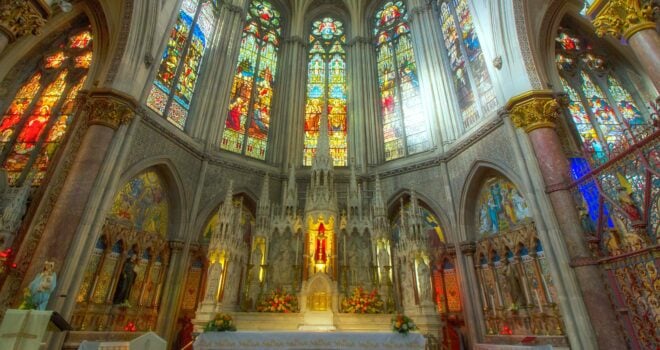Two thousand years ago, the eternal Word came to us as the Primordial Sacrament to make grace visible and to sanctify us. He gave us the example of sacrificial love to show us how to love God and others. He gave us the sacraments as sensible signs that communicate grace to sustain us and to help us grow in grace during his physical absence. Finally, He gave us the Church as the universal sacrament through which the Holy Spirit brings grace to the world.
Having covered the first three points in previous articles, this article will focus on the last point regarding the Church as universal sacrament. This universal sacrament is akin to the Garden of Eden in which the entire human family of God should have resisted sin, received the sacrament of the fruit of the tree of life, and grown in the grace and love of God.
The Universal Sacrament
Regarding the Church as universal sacrament, Catechism paragraphs 775-776 (paraphrased) state:
“The Church, in Christ, is like a sacrament—a sign and instrument . . . of communion with God and of unity among all men.” In her . . . the Church is the “sign and instrument” of the full realization of the unity yet to come. As sacrament, the Church is Christ’s instrument. “She is taken up by him also as the instrument for the salvation of all,” “the universal sacrament of salvation,” by which Christ is “at once manifesting and actualizing the mystery of God’s love for men.” The Church “is the visible plan of God’s love for humanity,” because God desires “that the whole human race may become one People of God, form one Body of Christ, and be built up into one temple of the Holy Spirit” (emphases mine).
Accordingly, the Church Jesus established is a place of unity (i.e., oneness) through grace for the whole world. Similarly, the Garden of Eden was a place of unity through grace for the entire human race.
The Garden of Eden
In the beginning, God created the Garden as a place for his children to thrive in grace and mature in their walks with Him. This was a place in which man should have maintained a connection to God through grace, sought and executed God’s will with truth and love, worshipped God perfectly and justly, and conceived and raised children who were full of grace. This was man’s “original birth” so to speak.
As we know, however, sin entered the world when Adam and Eve chose to disobey God. Consequently, God removed them from the Garden because they chose spiritual death through sin rather than life through grace, love, obedience, and eating from the tree of life.
Since our original parents exiled themselves form the Garden, every human after them needed a new garden (the Church), a rebirth (baptism), a new tree of life (Jesus), and a new sacrament that communicated life (the Eucharist). Jesus restored all of this by way of being the Primordial Sacrament.
The Church, the New Garden
Knowing that we are conceived in Original Sin, which deprives us of sanctifying grace, Jesus came as a remedy for our situation and to provide the structure through which He would communicate grace to the world. Therefore, He gave us a new garden, the Church. Just like the original garden, this garden gives the family one place to worship and receive the sacrament of life.
In this Church alone, we find the fullness of grace, faith, love, and truth. If we sin by actions (or inactions) that oppose faith, grace, love, or truth, we separate ourselves from the Church, but the Church continues as one body with those who remain in a state of grace. Just as the Garden of Eden was a holy place that contained the Tree of Life for those in grace, the Church reflects this original plan as a new Garden of Eden with an even better Tree of Life for those in grace.
Why One Sacrament?
After reading this, one might ask why the Church has seven sacraments, but the Garden had only one.
First, the Garden had two sacraments, the fruit from the tree of life and marriage. Sacramental marriage occurs when a man and woman in a state of grace enter a covenantal relationship with one another and with God. Genesis tells us that Adam and Eve had this kind of relationship. They were full of grace (Gen. 1:31, 2:17, and 2:9), and they enjoyed a “one flesh” union (2:22-25).
So, their marriage was sacramental, and if they and their children had never sinned, all marriages would have been sacramental. (For more on Adam and Eve being full of grace, please read this article.)
Regarding the other sacraments, baptism forgives sins and unites one to the Church. Similarly, confession forgives sins and reunites one to the Church. So, without sin, baptism and confession were not necessary.
Confirmation completes baptism and confirms a person in the Holy Spirit. However, Adam and Eve did not need this sacrament because God created them full of grace and the Holy Spirit.
Holy orders were not necessary because humans did not need a sacrifice for sins. And, since original man would not have gotten sick or died, the anointing of the sick would not have been necessary.
Therefore, in addition to marriage, Adam and Eve needed only fruit from the tree of life to grow in grace. If they had generated children who never sinned, these would have been the only two sacraments of which man would have ever partaken. The family would have remained united by grace.
The Prayer and the Call
In John 17:20-23, Jesus prays for the Church’s unity, and He calls His family to be one. St. Paul echoes Jesus’s call to unity in 1 Timothy 3:15, when he writes that the Church (not churches) of the living God is the pillar and bulwark of truth. And common sense tells us that we must seek unity in grace, truth, and love. Consequently, we must pursue life and unity in the garden that Jesus created, the Catholic Church, through which God gives us grace from the Eucharist and the other sacraments.
Author’s Note: Additional Reading:
- For more on grace, please click here.
- Regarding the historical fact that Jesus created the Catholic Church, please click here.
Photo by Riccardo Bonelli on Unsplash


















